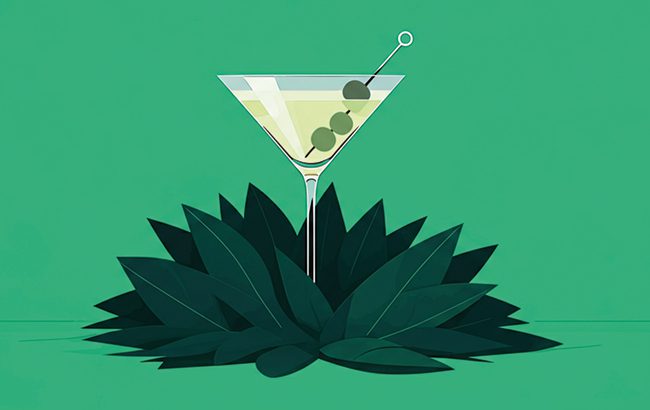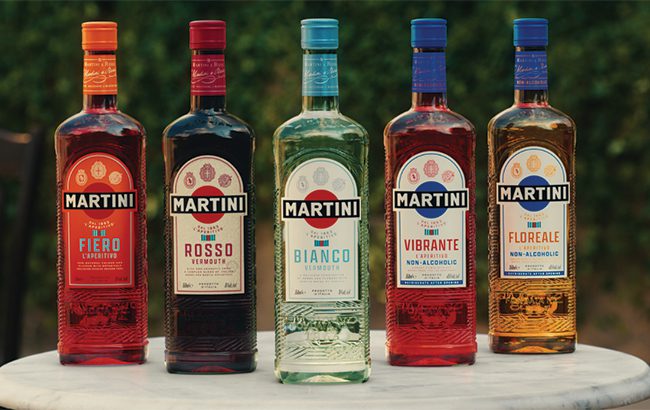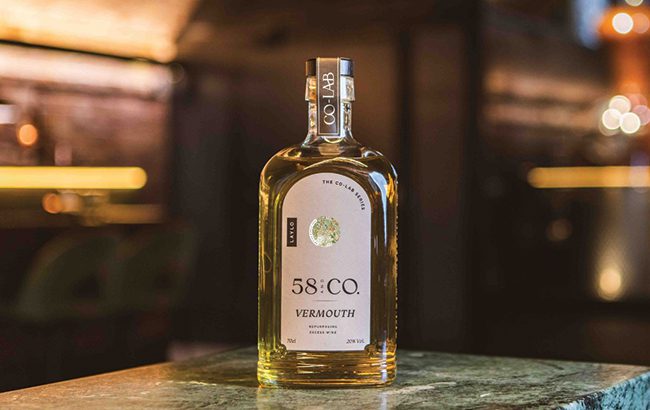Sustainability: vermouth goes green
By Lauren BowesRed, white and now green – vermouth producers the world over are making an effort to promote sustainability.

*This feature was originally published in the April 2025 issue of The Spirits Business magazine.
When we at The Spirits Business think about vermouth, it’s usually in relation to cocktails. The category has taken off in recent years, owing to the repopularisation of classic serves such as the Manhattan and the Negroni. While these drinks have become popular since the cocktail renaissance of the 1990s and onwards, this has mainly been led by specialised, on-trend cocktail bars.
That’s changing, according to Rafael Ferrer Trepat, global marketing director of vermouth brand Martini. “We’re seeing them come up on menus in more everyday venues, including restaurants,” he explains. ”To put it bluntly, what was once cutting-edge in the cocktail world has finally trickled down to the mainstream.
However, Martini is seeing particular growth in the aperitivo category. “The aperitivo occasion, which is worth US$11 billion, is growing at a rate of 6% across our key markets,” Ferrer Trepat says.
Interest in refreshing pre-dinner serves has largely been driven by the orange giant that is Aperol (it shifted 9.6 million nine-litre cases in 2023 – a 9.6% rise on 2022), but Martini – and other less seasoned vermouth brands – are now riding the wave. It’s worth noting, too, that Martini remains the world’s biggest vermouth brand, selling 9.6m cases in 2023.
Martini’s market dominance makes it a key indicator of the category’s future. This year, the brand revealed its new contemporary look and marketing campaign. While stunning design was top of the agenda, sustainability was another major consideration. The brand has reduced the weight of its one-litre bottles by 5%, which Ferrer Trepat says will reduce its carbon footprint by 1,300 tonnes a year. The slimmer bottle also means an extra 48 bottles can be carried on one pallet, making transportation more efficient.
Updating Martini’s recipe – which has remained constant since 1863 – to become more sustainable would be a little bit more difficult than adapting the packaging. However, in 1987, the brand established L’Osservatorio Martini, through which it works with growers to promote sustainable farming techniques. In addition, Ferrer Trepat says the vast majority of the wineries that supply Martini – “99% of them” – have been certified sustainable by Italy’s independent body Equalitas.
Focus on sustainability
Other smaller producers are also making sustainability a key focus, including Australian brand Regal Rogue, which was launched in 2011 by Mark Ward. “When I started to research, the only brands in the market were European,” he explains. “For me, having been in the industry for so long, it was an opportunity to ask why there wasn’t an Australian vermouth. We’ve got all this lovely wine and these native botanicals – there should be a representation of all that produce in the category.”
The brand didn’t start out thinking about sustainability. “In 2017, I decided to turn the whole business upside down to think about the future,” Ward explains. Regal Rogue was six years old and had won plenty of awards, but Ward wanted to ensure it would last at least another 10 or 15 years.
The answer lay in moving to an organic vineyard, sharing a home with See Saw Wine in Australia’s New South Wales. As well as growing only organic grapes, See Saw has a regeneration programme that has seen it plant more than 1,000 trees, shrubs, and native flora, and identify a biodiversity area on each of its farms to be a fenced-off home for bush and native animals. It also uses no herbicides, and See Saw is exploring the possibility of under-vine plants, which co-exist with the vineyard and result in improved soil health and a reduced need for fertiliser.

All of Regal Rogue’s packaging is recycled and recyclable. “Our five-litre bag-in-boxes outsell our bottles because everybody wants to save glass waste,” says Ward. And Regal Rogue’s consideration of sustainability goes beyond the environment: it sources all of its botanicals from Aboriginal communities.
Sustainability was top of the agenda for London’s 58 and Co when it launched its first vermouth last year. The brand doesn’t specialise in vermouths or even apéritifs – its ethos is about doing better for the planet. Its Co-Lab series sees the company partner with like-minded brands to repurpose by-products, with its vermouth the result of a tie-in with boxed wine brand Laylo. “The Co-Lab series is very much dependent on collaborating with other brands, seeing what by-products they have and what comes to us,” says head of marketing Aimie Neighbour.
Dig into the category
Neighbour reached out to Laylo purely because she liked the wine brand, expecting that the two could work together on an event. The result, however, was Laylo offering two pallets of Pinot Grigio that it had over-ordered. 58 and Co’s founder, Carmen O’Neal, and assistant distiller Siobhan Feeley, who both love vermouth, were overjoyed at the chance to finally dig into the category.
Some may turn their noses up at the idea of using waste wine. “Laylo is incredibly great at sourcing wine from incredible producers, and this wine was amazing,” explains Feeley. “It was still perfectly fine, it just didn’t match what they wanted as a flavour profile. Quality is important, but I don’t think you need to be using the top tier of wine. The whole reason vermouth was invented was to elongate the life of wine.”
Sustainability was also considered in the choice of botanicals. The brand grows many of its own botanicals for its flagship gin, so selecting them for a vermouth was almost second nature. “I wanted to harness the British palate, but through quite a traditional Italian/French/Spanish drink – encapsulating aperitivo culture, but giving it a British twist,” explains Feeley. One of the key botanicals is verbena. “When I was imagining a white vermouth, I was thinking about drinking it in the sun, and what kind of botanicals would give that feeling of the sun hitting your skin,” she adds. Wonky apples from Loddington Farm in Kent added yet another decisively English flavour, as well as a malic-acid bite.

Casals Vermouth – which is part of the Familia Torres group – is similarly raking in the eco-credentials, with its parent company having reduced CO₂ emissions by 37% as of 2023, and aiming to achieve net-zero emissions by 2040. At the minute, 55% of the energy required at its Penedès winery is produced through photovoltaic panels and a biomass boiler, and its glass bottles are made using 95% recycled glass. So far, so green. But what makes Casals unique in its sustainability ambitions is its dedication to recovering ancestral grapes, a project that began 40 years ago.
Christian Visalli, global spirits managing director at Familia Torres, explains: “The Torres family started a project to recover ancestral grape varieties, driven by their passion for viticulture and to help restore the viticultural heritage of Catalonia. Halfway through this journey, they realised some of these varieties not only had great winemaking potential but also the capacity to withstand the effects of climate change.”
The company now produces six wines using ancestral varieties. Casals is the world’s only vermouth made with Selma, a white grape native to Penedès. It has a “delicate aromatic profile”, says Visalli, which pairs well with its botanicals, such as olive leaves and thyme.
Whether through packaging, types of wine or botanical sourcing, vermouth makers are ensuring that this classic apéritif remains relevant – for today and into the future.
Vermouth in numbers
According to a report by Market.Us, in 2023 the vermouth category was valued at around US$11.6 billion, but this is expected to grow by a compound annual growth rate (CAGR) of 6.2% between 2025 and 2033.
Another report by IndustryARC anticipates a CAGR of 6.8% between 2022 and 2027, also noting that Europe has historically been vermouth’s biggest market, contributing to 36% of revenue share. North and South America are also key markets (22% and 15% respectively); however, Asia Pacific is the fastest-growing region – as with many spirits categories. More specifically, Vermouth di Torino – which has a protected designation of origin and includes brands like Martini – saw its volume sales more than double between 2018 and 2023, from 1.82 million litres to 4.2m.
Industry insights
How is your brand addressing sustainability?
Alex Ouziel – founder, Kaliro Spirits
“9 Di Dante’s sustainability objectives centre around our commitment to and support of local communities, by sourcing as many of the key ingredients and components as possible within a 100km radius of our facility. Our DOC-certified wines – Dolcetto, Cortese, Arneis, and Nebbiolo – all come from local Piedmontese co-operatives, and we extract all our 27 botanicals right at our distillery in Alba.
“All our bottles are made in Italy, and the serigraphy, corks, and cartons are all produced locally by family-run Italian businesses. In working with local and regional suppliers, we limit transport, support local economies, and maintain the quality of Piedmont’s wine and vermouth-making traditions.”
Related news
Familia Torres launches vermouth in UK
